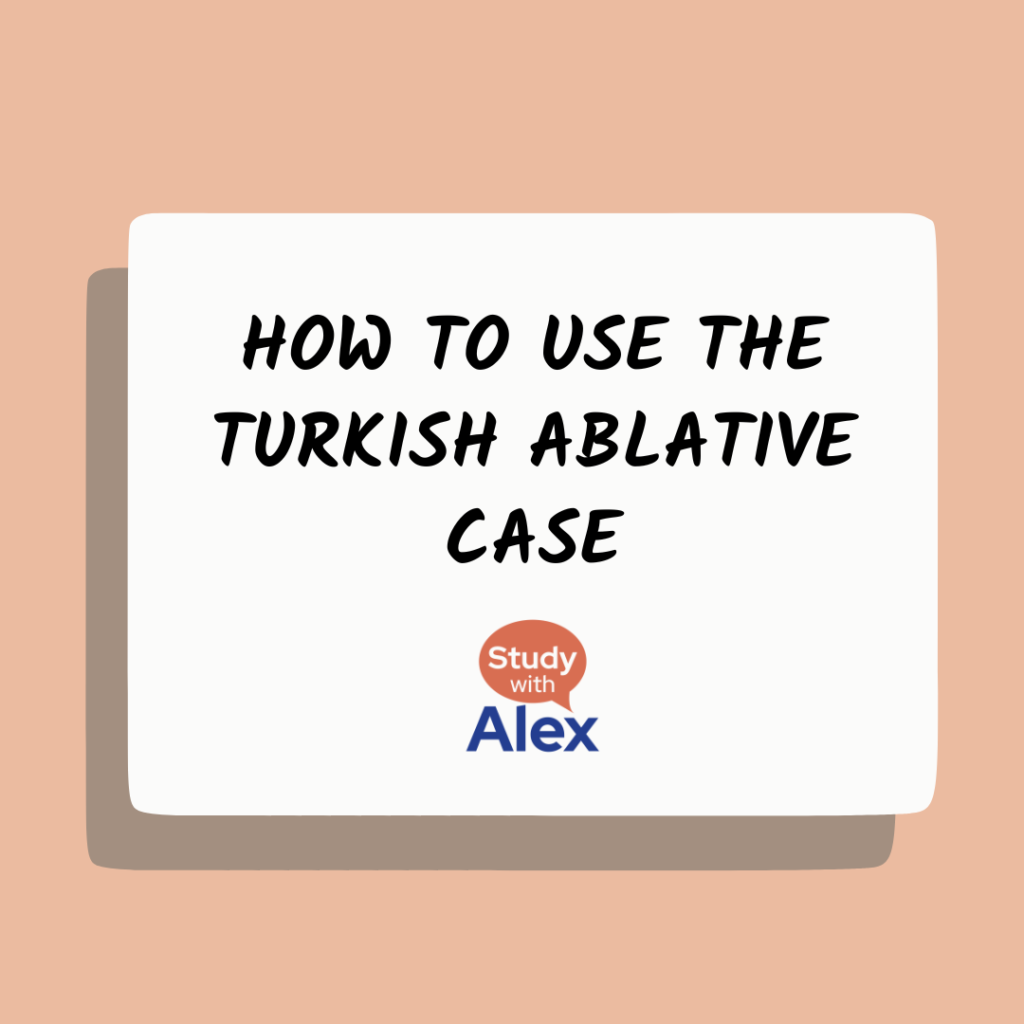Turkish has a lot of noun cases. They mark nouns with their function in the sentence. For example, Turkish has accusative, dative, and locative among others. The Turkish ablative case is one of the major cases that we must look at with a fine-toothed comb. It can seem simple to learners at first, but it is much deeper than you might think.

What is the ablative case?
The simplest English translation for the Turkish ablative case is “from,” but it is a little more complicated than just that. If we generalized, we could say it is about direction away from.
How do form the ablative case? You will add one syllable to the end of your Turkish noun that will vary according to vowel harmony. You will use -t- or -d-, and you will use -an or -en. More specifically, all the possible endings for the locative case are: -dan, -tan, -den, -ten. Which you will use will depend on the final syllable of the noun. This is identical to the locative case with an added -n.
Technically, there is buffer -n- included with the ablative. It will appear only when the noun is possessed by him, her, or them. A 3rd person possessive gets a -ı or -sı, which means it ends with a vowel. However, you cannot add -dan; you must add -ndan.
kedi > kedisi > kedisinden
cat > his cat > from his cat
ev > evi > evinden
house > his house > from his house
para > parası > parasından
money > his money > from his money
Please notice the ambiguity of evinde. It can be “from his house” or “from your house.” Be careful.
Here are the 5 rules to know when to use the Turkish ablative case:
Rule 1: the original location of a verb of motion
The only logically consistent rule for the Turkish ablative is that of verbs of motion. Where you would use “from” in English in most cases, you will use the ablative in Turkish. That’s the simple explanation.
The deeper explanation is about movement away from something. If you use go, come, take, bring, etc., the origin of your movement will be marked with -dan in Turkish. Although the “from” rule will account for a lot of uses, don’t rely on it. The extent of this rule is the origin of motion.
İstanbul’dan Ankara’ya arkadaşımı götürdüm.
= I took my friend from Istanbul (origin) to Ankara (destination).
Evimden çıktığımda kar yağıyordu.
= When I came out of my house (origin), it was snowing.
Rule 2: the object of particular verbs
Unfortunately, every other rule is less logical and predictable. This rule means you just have to memorize that some verbs take the ablative even though that doesn’t make sense in English. Erase your English perspective, and just remember verbs like vazgeçmek or bahsetmek just always take -dan.
Geç yemek yemekten vazgeçiyorum.
= I’m quitting eating food late.
Seninle son kez görüştüğümüzde yeni işe başladığından bahsettin.
= The last time I saw you, you mentioned you started a new job.
Special note: geçmek
-dan geçmek is not about the origin of motion – it’s about the place through which something travels. It fits in this rule because you just have to memorize that -dan geçmek always goes together for “pass through.”
Bu sabah şehir merkezinden geçtim.
= I passed through the city center this morning.
Rule 3: the complement of particular postpositions
Like rule 2, there is no logic to this rule. You just have to memorize that -dan goes before some postpositions. The most notable ones are önce and sonra.
Dün gece benden önce eve ulaştığını düşündüm.
= I thought you would arrive home before me last night.
İşten sonra seninle konuşmam lazım.
= I need to talk with you after work.
Rule 4: the complement of particular adjectives
Like rules 2 and 3, the logic of this rule is “you just gotta remember it.” You need to remember that adjectives like memnum and emin always need their nouns to end in -dan.
Yeni bir araba aldığından memnun olmalısın.
= You must be pleased that you bought a new car.
Kapıyı kilitlemeyi unutmadığımdan eminim.
= I’m sure that I didn’t forget to lock the door.
Rule 5: the object of comparison
There is some logic to rule #5, fortunately. The complicated explanation is that you use this to mark words you are making comparisons to. The simple explanation is this can be translated as “than” in English. In most comparisons of more or less than, the word that would go after “than” in English gets –dan at the end in Turkish.
Kazakistan Türkiye’den daha büyük.
= Kazakhstan is bigger than Turkey.
Senden daha fazla kitap okurum.
= I read more books than you.
Summary
- Motion away from somewhere
- The object of certain verbs (arbitrary)
- Connected with certain postpositions (arbitrary)
- Connected with certain adjectives (arbitrary)
- “than”
Now, I am sure you understand this grammar. Bu dilbilgisini anladığınızdan eminim.
This is less complicated than a few of the other Turkish noun cases, so you can focus more time on the more complicated ones.
It is important that we do not overlook the complexity of simple grammars, however. You might have thought –dan just means “from” in Turkish, but it’s more complicated. That oversimplification does not acknowledge these other very important situations to use this grammar. As such, I recommend you review other Turkish noun cases – even if you think you know them.
If you want to read more about Turkish grammar and other cases like the Turkish ablative, check out my other articles on the topic.
Also, be sure to check out my personal language journey on my YouTube, where you can get some tips and tricks that can help you learn Turkish or any target language better.
Kolaylıklar dilerim!